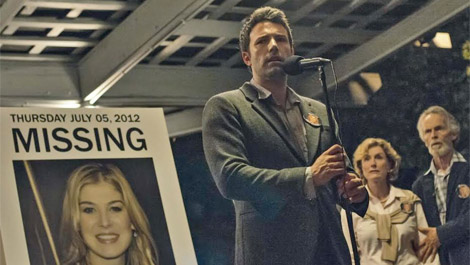Why you can trust 12DOVE
"I’ve gone mainstream,” mutters Nick Dunne (Ben Affleck) when the case of his missing wife, Amy Elliott Dunne (Rosamund Pike), leaps from local to national news. The same might be said of David Fincher, whose 10th film, based on the same-titled bestselling crime-thriller by Gillian Flynn, sees the filmmaker focus his directorial brio (no giddy crash-zooms through coffeepot handles here) to deliver a clear-eyed, unfussy, startlingly faithful adaptation of the 2012 page-turner.
But given the primary theme of both book and movie is that of perception – of how we painstakingly package ourselves and project images to fool not only the public but those closest to us and even ourselves – you’d be wise to look closer.
Yes, Gone Girl is an absorbing whodunit that cleaves to a gleefully pulpy narrative full of twists and turns, not all of them easy to swallow. But it’s also a black-hearted reflection on the death of journalism, the mutability of the justice system, the bust economy and, front and centre, the insanity of marriage. Fincher’s self-proclaimed mission statement was to make a movie that walks a thin line between funny and sick, and his coolly crafted picture nary puts a foot wrong: this might just be the most fucked-up date movie since Takashi Miike’s Audition took relationships to the (piano) wire.
Married in New York, Nick and Amy move back to his hometown of North Carthage, Missouri after they both lose their magazine jobs and Nick’s mother is diagnosed with terminal cancer. Almost three years into their Midwest purgatory, on the morning of their fifth wedding anniversary, Amy goes missing. Overturned furniture in the living room indicates a struggle, and the detectives assigned to the case (Kim Dickens and Patrick Fugit) suspect murder when the forensic evidence points to a substantial loss of blood, hurriedly cleaned up, in the Dunne’s kitchen.
Given Amy’s parents have plagiarised, idealised and serialised their daughter’s life in a bestselling range of children’s books entitled ‘Amazing Amy’, the case breaks countrywide. Everyone, of course, knows that it’s always the husband, and each new find in the investigation only serves to intensify the media spotlight on Nick. But consider the tagline on the paperback jacket: there are two sides to every story…
As the two million people who have purchased the novel will know, the biggest obstacle facing the adaptation is wrestling the time-hopping, twin-perspective, heavily internalised narrative into shape. Flynn, who wrote the screenplay under Fincher’s unblinking scrutiny, has done just that. Using Amy’s diary entries to cue flashbacks to the couple’s meet-cute in Manhattan, the film glides between the ongoing investigation and key vignettes from their five-year marriage as love and harmony sour to indifference and resentment.
The script, in fact, is a textbook example of how to turn a chunky novel into a digestible movie, with Flynn condensing, stitching and excising while retaining plot kinks, subtexts and a plethora of character detail (quizzes, treasure hunts, Amy’s savage deconstruction of the ‘Cool Girl’). Voiceover is employed sparingly and skilfully to verbalise the protagonists’ innermost, often deceptive, thoughts – Nick opens the film with “I picture cracking her lovely skull, unspooling her brains, trying to get answers” – but Fincher is never afraid to allow viewers to make their own connections, provide their own consensus.
Casting, of course, is key, and Affleck, with his innate likeability and first-hand experience of being denigrated by the media, is the embodiment of Nick (he retains viewers’ sympathy even when being a first-class shit), while Pike, as Fincher himself has stated, has the brains, beauty and opacity of Amy.
But it doesn’t stop there. Gone Girl gets it right from top to bottom, with Dickens, Carrie Coon (as Nick’s twin sister, Margo), Neil Patrick Harris (Amy’s ex, Desi Collings) and one-man media brand Tyler Perry (hotshot lawyer Tanner Bolt) all nailing their support roles, with the likes of Scoot McNairy, Kathleen Rose Perkins and Missi Pyle all making an impact with just a scene or two.
As ever, Fincher knows his world and its inhabitants inside and out, from New York book launches to the McMansions of Missouri to the motels and gas stations where some of the action plays out. The themes are universal but this is an American crime story with specificity to its geography and psychopathology.
Fincher’s gone mainstream? Maybe so, but that only means even greater numbers will be exposed to his signature brand of pollution. Now that’s funny. And kinda sick.
Jamie Graham is the Editor-at-Large of Total Film magazine. You'll likely find them around these parts reviewing the biggest films on the planet and speaking to some of the biggest stars in the business – that's just what Jamie does. Jamie has also written for outlets like SFX and the Sunday Times Culture, and appeared on podcasts exploring the wondrous worlds of occult and horror.

Ex Nintendo PR managers say the Switch 2 generation is likely to see the retirement of "several of the major developers at Nintendo who we have known for 40 something years"

Helldivers 2 CEO says industry layoffs have seen "very little accountability" from executives who "let go of one third of the company because you made stupid decisions"

Spider-Man: Brand New Day - How Peter Parker and Mary Jane's break up led to one of the wall-crawler's most transformative comic eras











